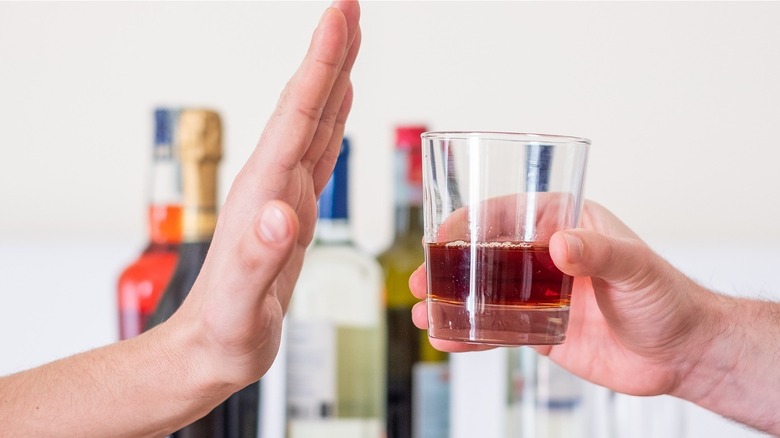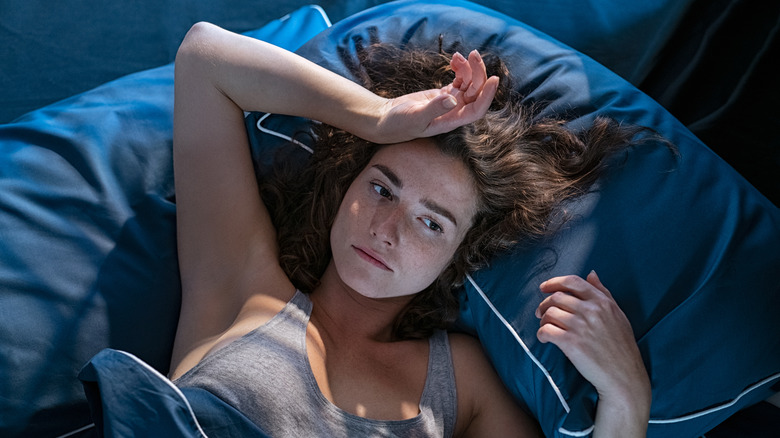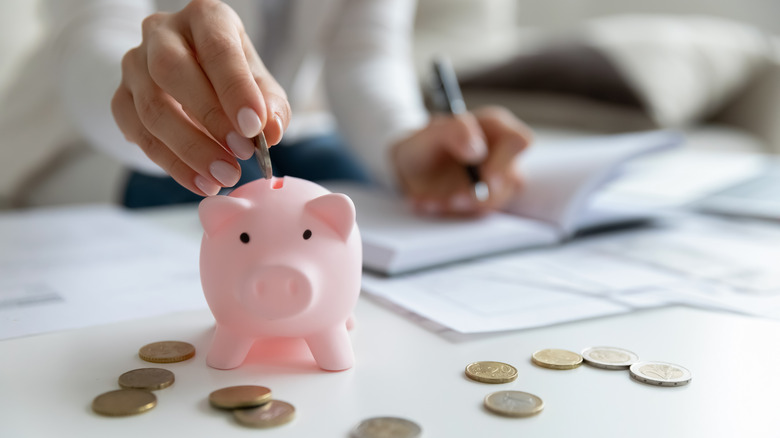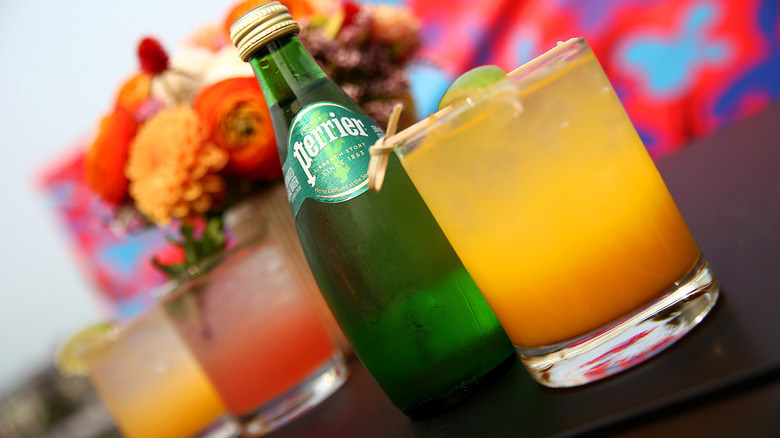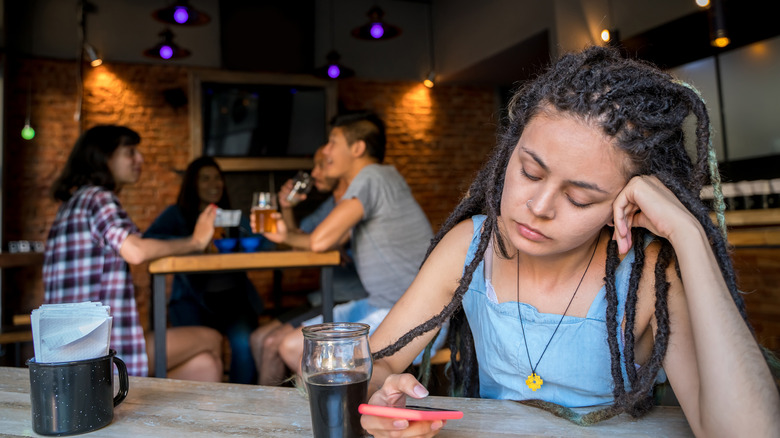What To Know If You're Thinking Of Trying Dry January
Dry January got its start in the U.K. in 2014 as a challenge to the sober-curious to take a 31-day "test-drive" of the booze-free lifestyle. Six years after it started, Vice found that the number of U.S. participants was on the decline. Just 14% planned to participate in 2020, which was quite the drop from the 23% who'd intended to do so in 2019. While the numbers for 2022 aren't in yet, YouGov does report that 15% of American adults planned to go dry in January of 2021.
So does this mean that the wheels — and the participants — have fallen off the wagon? No, that appears not to be the case at all. Instead, the lower numbers of people doing Dry January may well be due to lower numbers of people who are drinking, period. In 2018, it seems that just 24% of adults in the U.S. were habitual alcohol abstainers, while by 2019 that number had jumped to 33%. As of a recent Gallup poll, it seems that about 40% of us are saying no to booze.
While there are no hard-and-fast statistics tying Dry January participation to opting for year-round sobriety, WebMD says it can be a "gateway" to recovering from alcohol dependence. Even light to moderate drinkers stand to benefit by experimenting with ways to relax and enjoy themselves without any alcohol.
1. A month's sobriety offers quite a few health perks
According to Good Housekeeping, even a 31-day sojourn in the land of sobriety could be very good for your health. When you go to bed booze-free, you'll likely enjoy better sleep and wake up feeling more refreshed — not to mention hangover-free, of course. Booze contains calories, too, so cutting out a few beers or glasses of wine per day could result in weight loss, or at least allow you to replace those empty calories with healthier alternatives. Reducing your alcohol intake could also benefit your skin since alcohol dehydrates the body and can have the effect of making you look older. What's more, drinking less alcohol will help your body's immune system, and this at a time of year when colds and flu are prevalent.
There is one very important caveat as regards the health benefits of Dry January. Ian Hamilton, who lectures on substance abuse at York University, warns that this cold-turkey approach is not safe for the heaviest drinkers (via the Daily Mail). Anyone who is seriously alcohol-dependent, he says, is at risk of medical problems including seizures if they attempt an abrupt detox without a doctor's supervision.
If you or anyone you know is struggling with addiction issues, help is available. Visit the Substance Abuse and Mental Health Services Administration website or contact SAMHSA's National Helpline at 1-800-662-HELP (4357).
The first few days might be kind of rough
Unfortunately, your first few days of sobriety won't exactly bounce you right into a healthy, happier new lifestyle. Sadly, in this, as in all other forms of health improvement, it seems there must be a little pain in order to see some gain. Red explains that at first you may experience some trouble getting to sleep as your body learns to cope with this new development. You may even, ironically, begin to feel hungover after a few days. How unfair is this, and more importantly, why is it happening? These ill effects are likely from dehydration, so be sure to substitute some kind of beverage for the alcoholic drinks you're not having.
One thing that alcohol contains in abundance is sugar, which is why you may also start to crave candy, cookies, and cake once you give up drinking. While you may feel that a little compensatory indulgence is due you, try not to go too overboard on the sweet treats.
You'll likely save some money
If you are going out to bars or ordering cocktails, beer, or wine with your restaurant meals, then the cost of those drinks is doubtlessly adding up to quite a hefty sum. Even if you do most of your drinking at home, you could still be spending more than you think on booze. Study results published in USA Today showed that as of 2019, millennials typically spent approximately $300 per month on drinks, while Gen Z came in around $150 and boomers about $100 per month. If the thought of having extra money in your pocket is what appeals most to you about Dry January, you might like to download the Try Dry app as it includes a calculator that will let you track your savings.
If you are feeling philanthropic, you can always offer up those savings to charity. The Dry January website even has a tool that will allow you to set up a website and solicit people to sponsor your non-drinking as a fundraiser.
There are a lot of alcohol substitutes on the market
Sure, you could just stick to soda for a month, but if you miss your cocktails, you'd probably get a lot more enjoyment out of a tasty mocktail. Sadly, not too many bars and restaurants seem to feature these on the menu, and when you ask what the nonalcoholic options are, you may be met with a curt "Pepsi products" (or, for a non-thrilling change, Coke ones). Instead, take a little of the cash you'd have spend at those establishments and hit the grocery store for the ingredients to mix up your own homemade mocktails. If you're not a fan of fruit juice + soda, you can still enjoy a mocktail that's more "spirit-forward," although the "spirits" in question will be 0-ABV ones. Some of the more popular brands of alcohol-free distilled liquor substitutes include Ritual and Seedlip.
Non-alcoholic beers are readily available these days, and they are improving in quality all the time. Even craft breweries are getting into the NA game — no surprise, as Craft Beer reports that the demand for NA products is expected to quadruple by 2025. Old standbys like O'Doul's are still holding strong, as well. Non-alcoholic wines, as well as beers, are increasing in popularity. In fact, there's now even a celeb-branded non-alcoholic wine line: Fosé Rosé, brought to us by RHONY's Luann de Lesseps.
You might catch a certain amount of flak
Dry January started in the U.K., and it perhaps remains more socially acceptable in that country. Red notes that British bars and restaurants frequently expand their non-alcoholic options for the duration, but depending on where you live, you might not see this in the U.S. What's more, no matter what time of year you try to limit your alcohol consumption, you may find that not everyone supports your decision.
Inc. reports that in many workplaces, there is a great deal of pressure to drink alcohol as some sort of collegial or bonding experience. Counter-intuitive as it might seem, non-drinkers are often discriminated against on the job. Anyone trying to dry out may also have problems with friends and family members who don't want to join them and feel threatened by their choice, or perhaps see such an action as being judgmental.
You may wish to avoid discussing your Dry January plans and progress with those who hold such views, but should you find yourself in a situation where others are drinking and questions arise, you don't really owe anyone an explanation. Simply state your beverage selection is a matter of your own personal choice and leave it at that. Be prepared, though, that your Dry January might not be smooth sailing, and have some empathy for people whose religious beliefs, health conditions, or recovery from substance abuse issues have them dealing with this anti-non-drinking prejudice 12 months out of the year.
